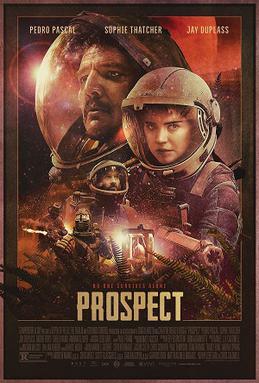I didn’t know anything about Prospect, merely stumbling across it via the suggested for you feature on Netflix.
I took a chance and fired it up. Originally, I was a bit skeptical, because I’d never heard of the film companies that worked on the film, and thought it might be a low-budget, B-rate sci fi movie.
But then, 20 minutes in, I spotted Pedro Pascal, and my fears were assuaged. I’m not saying Prospect is the best sci fi movie on Netflix, but it was pretty darn good.
The Details
Prospect is a 2018 film written and directed by Zeek Earl and Chris Caldwell. Earl and Caldwell previously made commercials and short films with their company, Shep Films, and Prospect was their first movie.
The film stars Sophie Thatcher, Jay Duplass, and Pedro Pascal (who many people know from the wildly popular Star Wars show, The Mandalorian).
Prospect received mixed reviews, with some critics praising the world-building, while others noted that Earl and Caldwell’s character development was lacking.
The Premise
The story follows Cee, a teenage girl who travels to a foreign moon with her father to mine for precious gems.
Along the way, Cee’s father is killed by Ezra, a rogue miner/mercenary stranded on the moon. Despite that, Cee and Ezra have to work together to find a way off the moon before their short window for escape passes them by.

Photo from Wikipedia
Signals Sci-Fi Movie Review
Above all else, Prospect is a simple film. Unlike some other popular sci-fi films, its scope isn’t massive. Nothing about saving the universe or the fate of humanity. Instead, the film places its focus on the interactions of a couple of people, and the conflict is all about Cee and Ezra putting aside their differences to survive.
Personally, stories that operate in a microcosm—or at least, not on a universal scale—always seem more satisfying to me. For example, I’d prefer to watch the Luke Cage Netflix show than the Avengers movies. Luke Cage feels more realistic, which I guess isn’t what people watch superhero literature for, but c’est la vie.
Anyways, I like the small scope of Prospect, because it makes it easier to focus on the characters.
Cee’s father, Damon, has about 25 minutes of screentime, but from the first scene, it’s easy to dislike him. Once he dies, it creates an interesting dynamic between Cee and Ezra. She hates him for killing her father, but also recognizes how different he is from Damon, better in some ways.
Some critics have said that Ezra’s character is pretty stale, and the only reason it’s interesting is because Cee acts as a foil—or a reverse foil?—and in some ways, I agree.
We don’t get very much information about Ezra’s past, only that he is stranded on the forest moon because his crew committed a mutiny and took his ship. Other than that, the audience is left guessing his past.
But I don’t think the story is supposed to be about Ezra. His presence is a catalyst for Cee’s character growth, her ‘coming of age’ if you will.
We know much more about Cee. Even the little details give us a glimpse into her past. Her conversations about her mother, her escapism through music and reading, her calm demeanor in sticky situations, all those things make her a vibrant, deep character.
The Verdict
Prospect’s pacing was on point, and visually, it was a simple film. The whole story takes place on the forest moon, but there isn’t very much variation in the scenery. A lot of green! I’d have like to see a bit of deviation of color.
While the film was entertaining, it leaves a lot of unanswered questions.
- What happened to Earth?
- What year is it?
- What’s Ezra’s past?
- What will happen next?
Some of these things are arbitrary, nonessential to the story. However, I would have liked to have a firmer understanding in the world Prospect is framed in. Maybe I’m just being a stickler or a massive sci-fi nerd, but I feel like knowing the year is a must.
Overall, Prospect was a good first film from Shep Films. Its simplistic story model let you focus on the character interactions, but sometimes those interactions fell flat. The film is missing a few key details to really root in a place and time, and sometimes the film expects viewers to grasp the sci-fi concepts without having previously explained them.
I’d give Prospect a 7/10. Sophie Thatcher and Pedro Pascal made a great duo, and I’d like to see more of their adventures, but I definitely felt like there was room for improvement.
So, not the best sci-fi movie on Netflix, but worth a watch if you don’t have something more interesting to watch.






 According to Wikipedia, “Passengers is a 2016 American
According to Wikipedia, “Passengers is a 2016 American